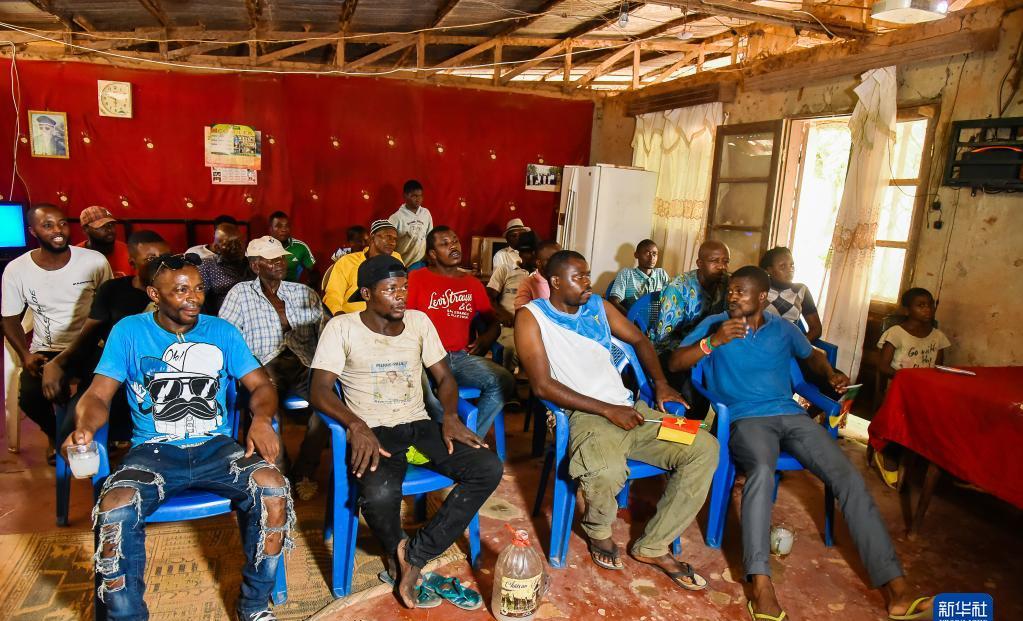
It was January 13, in the village of Tiruna in Cameroon, where villagers watched the Africa Cup of Nations on a projection TV. Xinhua News Agency (Photo by Copso)
Xinhua News Agency, Yaoundé, January 26 (Xinhua) -- Communications: China's construction of the "10,000 Villages Pass" has made Cameroonian villagers look at the African Cup of Nations at their doorstep
Xinhua News Agency reporter Luo Yu
When the reporter interviewed in the village of Diruna in Cameroon a few days ago, he found that the life of villager Jackson Ndongo had new expectations.
From January 9 to February 6, the Africa Cup of Nations football tournament was held in Cameroon. Watching the game became the most anticipated moment after the daily work of the football-loving Ndongo.
Located more than 70 kilometres north of Theravin, the capital of Cameroon, the village has about 1,000 villagers, and there are very few families with televisions, and if they do, they can only watch a few local stations.
"It used to be difficult to watch the game." Because there is no television at home, Ndongo said that whenever there is a major race, he has to go to the town's bar a kilometer away to watch.
However, that has now changed.
The 2015 Johannesburg Summit of the Forum on China-Africa Cooperation proposed "satellite TV viewing project for 10,000 villages in Africa". Four years later, the Chinese-funded enterprise Sida Times, the executive unit of "Wancuntong", entered Cameroon and has now installed tv sets and supporting facilities for a total of 6,000 families and 900 public areas in 300 villages, including Diruna Village.
Ever since the village has a 100-inch, HD-resolution projection TV with at least 30 free programs, Endungo has never had to travel far to watch a ball game.
It was January 13, in the village of Tiruna in Cameroon, where villagers celebrated cameroon's victory over their opponents as they watched the Africa Cup of Nations on a projection TV. Xinhua News Agency (Photo by Copso)
During the interview, the reporter coincided with a key match for the Cameroonian team. At five o'clock in the afternoon, Ndongo and about 20 villagers finished their farm work, carrying a barrel of palm wine, and came to the village's projection TV to watch the game.
At the end of the match, Cameroon won 4-1 to advance to the second round. Ndongo and several villagers jumped up excitedly and hugged each other. "Cameroon's performance tonight was so good, I was so happy, and even happier, the projection TV signal was good, the picture quality was high, and the viewing experience was not compromised." Ndongo said.
In the program channel provided by "Wancuntong", in addition to football matches, there are also international and domestic news, epidemic prevention knowledge, and even Chinese translated film and television dramas.
"We can see many high-quality programs, we often have power outages here, the solar cells supporting the TV just solve this problem, and the 'Wancuntong' built by Chinese enterprises has a sense of social responsibility." Ndongo said.
In more interviews, the reporter found that chinese builders are not only thinking about the pleasure and relaxation brought by watching a ball game after work, they want to bring a window to the world and more employment opportunities for the African people.
"These different programs helped the villagers break through cognitive biases and broaden their horizons, and many young villagers began to realize that there were more opportunities outside and planned to go out and explore." Xue Xiaoke, the general coordinator of the "Ten Thousand Villages Pass" in Kazakh, said.
"Wancuntong" not only allows villagers to "connect" the world, but also cultivates more than 600 local technical talents.
"We young people in Cameroon have benefited a lot, not only making money and improving their lives, but also learning new skills." The 32-year-old Laurent Barra has been employed in Starcard for five years, and after professional training, he often shuttles between local villages to provide technical support for project operations, and has now grown to become the regional manager of the central region of Starda Times.
"In the context of China-Africa digital cooperation, we used advanced technology to help African countries build digital television signal networks and transfer technology so that they have the ability to independently produce digital audio-visual content." Xue Xiaoke said.
"300 villages is not enough now, we should go further and let the '10,000 villages' spread throughout Cameroon." Didier Aliguan, technical director of the CameroonIan Ministry of Public Information to connect with the "10,000 Villages", is full of confidence in the future of the "10,000 Villages".